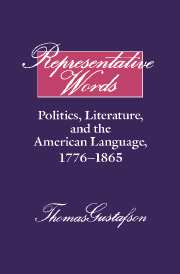Book contents
- Frontmatter
- Contents
- Acknowledgment
- Abbreviations and Editions Cited
- Introduction
- Part I The American Logocracy: The Nexus of Word and Act
- Part II Political and Linguistic Corruption: The Ideological Inheritance
- 3 The Classical Pattern: From the Order of Orpheus to the Chaos of the Thucydidean Momen
- 4 The Christian Typology: From Eden to Babel to Pentecost
- 5 Eloquence, Liberty, and Power: Civic Humanism and the Counter-Renaissance
- 6 The Enlightenment Project: Language Reform and Political Order
- Part III The American Language of Revolution and Constitutional Change
- Part IV From Logomachy to Civil War: The Politics of Language in Post-Revolutionary America
- Afterword
- Notes
- Index
- Cambridge Studies in American Literature and Culture
4 - The Christian Typology: From Eden to Babel to Pentecost
Published online by Cambridge University Press: 05 January 2012
- Frontmatter
- Contents
- Acknowledgment
- Abbreviations and Editions Cited
- Introduction
- Part I The American Logocracy: The Nexus of Word and Act
- Part II Political and Linguistic Corruption: The Ideological Inheritance
- 3 The Classical Pattern: From the Order of Orpheus to the Chaos of the Thucydidean Momen
- 4 The Christian Typology: From Eden to Babel to Pentecost
- 5 Eloquence, Liberty, and Power: Civic Humanism and the Counter-Renaissance
- 6 The Enlightenment Project: Language Reform and Political Order
- Part III The American Language of Revolution and Constitutional Change
- Part IV From Logomachy to Civil War: The Politics of Language in Post-Revolutionary America
- Afterword
- Notes
- Index
- Cambridge Studies in American Literature and Culture
Summary
On this Western hemisphere all tribes and people are forming into one federated whole; and there is a future which shall see the estranged children of Adam restored to the old hearth-stone in Eden… Then shall the curse of Babel be revoked, a new Pentecost come.
Herman Melville, RedburnFor Henry James, the Civil War was a “great convulsion” that brought about the loss of an innocent new world in America, and for Herman Melville the conflict between North and South challenged the “Founders' dream” that America could begin and build a government founded on a higher power than force. “The Civil War,” James declares, “marks an era in the history of the American mind. It introduced into the national consciousness a certain sense of proportion and relation, of the world being a more complicated place than it had hitherto seemed, the future more treacherous, success more difficult… The good American, in days to come, will be a more critical person than his complacent and confident grandfather. He has eaten of the tree of knowledge.” In one of his Civil War poems, “The Conflict of Convictions,” Melville also turns to biblical (and Miltonic) imagery to portray the war as “man's latter fall” from grace.
Return, return, O eager Hope
And face man's latter fall.
Events, they make the dreamers quail;
Satan's old age is strong and hale.
(BP, 37)In the last stanza, Melville describes the probable loss of another vision of paradise:
Power unanointed may come –
Dominion (unsought by the free)
And the Iron Dome,
Stronger for stress and strain,
Fling her huge shadow athwart the main;
But the Founders' dream shall flee.
(BP, 40)- Type
- Chapter
- Information
- Representative WordsPolitics, Literature, and the American Language, 1776–1865, pp. 99 - 116Publisher: Cambridge University PressPrint publication year: 1993



